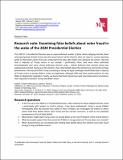Research note: Examining false beliefs about voter fraud in the wake of the 2020 Presidential Election
Author(s)
Pennycook, Gordon; Rand, David G
DownloadPublished version (1.572Mb)
Publisher with Creative Commons License
Publisher with Creative Commons License
Creative Commons Attribution
Terms of use
Metadata
Show full item recordAbstract
<jats:p>The 2020 U.S. Presidential Election saw an unprecedented number of false claims alleging election fraud and arguing that Donald Trump was the actual winner of the election. Here we report a sur-vey exploring belief in these false claims that was conducted three days after Biden was declared the winner. We find that a majority of Trump voters in our sample – particularly those who were more politically knowledgeable and more closely following election news – falsely believed that election fraud was widespread and that Trump won the election. Thus, false beliefs about the elec-tion are not merely a fringe phenomenon. We also find that Trump conceding or losing his legal challenges would likely lead a majority of Trump voters to accept Biden’s victory as legitimate, alt-hough 40% said they would continue to view Biden as illegitimate regardless. Finally, we found that levels of partisan spite and endorsement of violence were equivalent between Trump and Biden voters.</jats:p>
Date issued
2021Department
Sloan School of ManagementJournal
Harvard Kennedy School Misinformation Review
Publisher
Shorenstein Center for Media, Politics, and Public Policy
Citation
Pennycook, Gordon and Rand, David G. 2021. "Research note: Examining false beliefs about voter fraud in the wake of the 2020 Presidential Election." Harvard Kennedy School Misinformation Review.
Version: Final published version